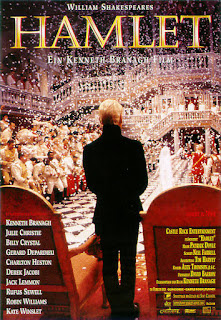
Director: Kenneth Branagh
Stars: Kenneth Branagh, Julie Christie, Derek Jacobi
Continuing on the Kenneth Branagh Shakespearean riff started with Henry V, today we look at Hamlet, that melancholy Prince of Denmark that so famously dithers endlessly before avenging his father’s murder.
Branagh’s Hamlet is an ambitious, star-filled, gorgeous set-piece….that last four hours. Yes, that’s
right, four hours, 242 minutes. Branagh decided to make the definitive film version of the play, unabridged, drawn from the 1623 version printed in the First Folio, with some additions and amendments.
Hamlet, on the off-chance you aren’t familiar with it, tells the story of Hamlet, the Prince of Denmark, who returns home to Elsinore Castle from his studies in Wittenberg upon the death of his father, the King. Hamlet (played by Branagh with serious brooding intensity and, at times, manic energy) discovers, to his intense anger, that his widowed mother (Julie Christie) has incestuously married his uncle Claudius (Derek Jacobi), the King’s brother, who has now assumed the crown. The introspective Prince is further driven into his moody thoughts when he encounters his father’s ghost, a paternal haunt that tells the young Prince that he was murdered by Claudius. Hamlet, driven by his own internal angst and spurred to action, spends much of the following acts of the play alternating between feigning madness, making moody and profound pronouncements on the nature of life, and plotting how to “catch the conscience of the King” to get proof of his Uncle’s perfidy.
After much back-and-forthing, driving his lady-love Ophelia (well-played by a young Kate Winslet) to madness, accidently murdering her father Polonius (the King’s advisor, well played by Richard Briers as the most portentous windbag you have ever seen. Never have I been more pleased to see a relatively harmless character die.), before using a travelling playing troupe to “entrap” the King. Now convinced of the ghost’s veracity and his uncle’s guilt, Hamlet is exiled to England for the murder of Polonius. Hamlet escapes, returns to Elsinore and is tricked by Claudius into a duel with Ophelia’s brother Laertes who is seeking revenge for his father and sister’s deaths. Unbeknownst to Hamlet, the swords are poisoned, the wine is poisoned, and before you can say “Good God is this still going on…?” pretty much everyone of note meets a tragic end. Roll credits.
I will say it again – Four. Hours. Long. I come back to it mainly because Hamlet is Shakespeare’s longest play, and arguably his most famous. This film version is most probably the most complete you will ever see – mostly uncut, intact, unadulterated brilliance. You can’t watch Hamlet for more than five minutes without running across some recognizable aphorism, quote or saying. Hamlet is justifiably one of the most oft-quoted pieces of literature in history, with many not even realising that common sayings they may have used in conversation actually derive from Shakespeare’s most famous play. Here’s some examples:
“to thine own self be true”
“conscience does make cowards of us all”
“Though this be madness, yet there is method in't”
“Brevity is the soul of wit”
“One may smile, and smile, and be a villain.”
“Sweets to the sweet.”
“The lady doth protest too much”
 Branagh’s Hamlet is less moody and more banked anger, standing in somber black contrast against the colourful pageantry of Claudius’ Court. The setting for the film is a 19th C period rather than medieval Denmark, a setting resonant with declining empire, corruption, social change and decadence. The acting, for the most part, is superb, with the long cast list offering up a veritable who’s who of Shakespearean and Hollywood actors, including Charlton Heston, Jack Lemmon, Richard Attenborough, Judy Dench, Brian Blessed, Billy Crystal, Robin Williams and, apparently, the 11th Duke of Marlborough as a Norwegian Captain.
Branagh’s Hamlet is less moody and more banked anger, standing in somber black contrast against the colourful pageantry of Claudius’ Court. The setting for the film is a 19th C period rather than medieval Denmark, a setting resonant with declining empire, corruption, social change and decadence. The acting, for the most part, is superb, with the long cast list offering up a veritable who’s who of Shakespearean and Hollywood actors, including Charlton Heston, Jack Lemmon, Richard Attenborough, Judy Dench, Brian Blessed, Billy Crystal, Robin Williams and, apparently, the 11th Duke of Marlborough as a Norwegian Captain.The only misstep in casting was probably the late Robin Williams as the supporting role of Osric, who looks intensely self-conscious and uncomfortable, even when just standing still. Billy Crystal on the other hand is terrific as one of the caustic gravediggers, trading barbs with Branagh over the disinterred bones in the graveyard scene.
Filmed at the palatial vastness of Blenheim Palace for the exterior and a huge interior set extravagant with mirrors and vaulting ceilings, the film does a terrific job in making Elsinore look both expensive, rich and disconnected from the reality of the exterior world. To an extent, it mirror’s Hamlet’s own abrupt shifts from ordered world / sanity to chaos / madness, from lawful order to murder. Hamlet’s famous soliloquy (the longest Shakespeare ever wrote) is staged beautifully with an introspective Hamlet, in an odd moment of calm, contemplating his reflection in the mirrored hall, dagger in hand, intensity at maximum, while his uncle and Polonius are hidden behind the mirrored glass, transfixed.
With the innocent bodies piling up in his wake, Branagh’s Hamlet seems more and more disconnected from the bloody reality trailing him, intent on his interior journey of revenge and self-destruction.
Great movie. Damn long.

No comments:
Post a Comment